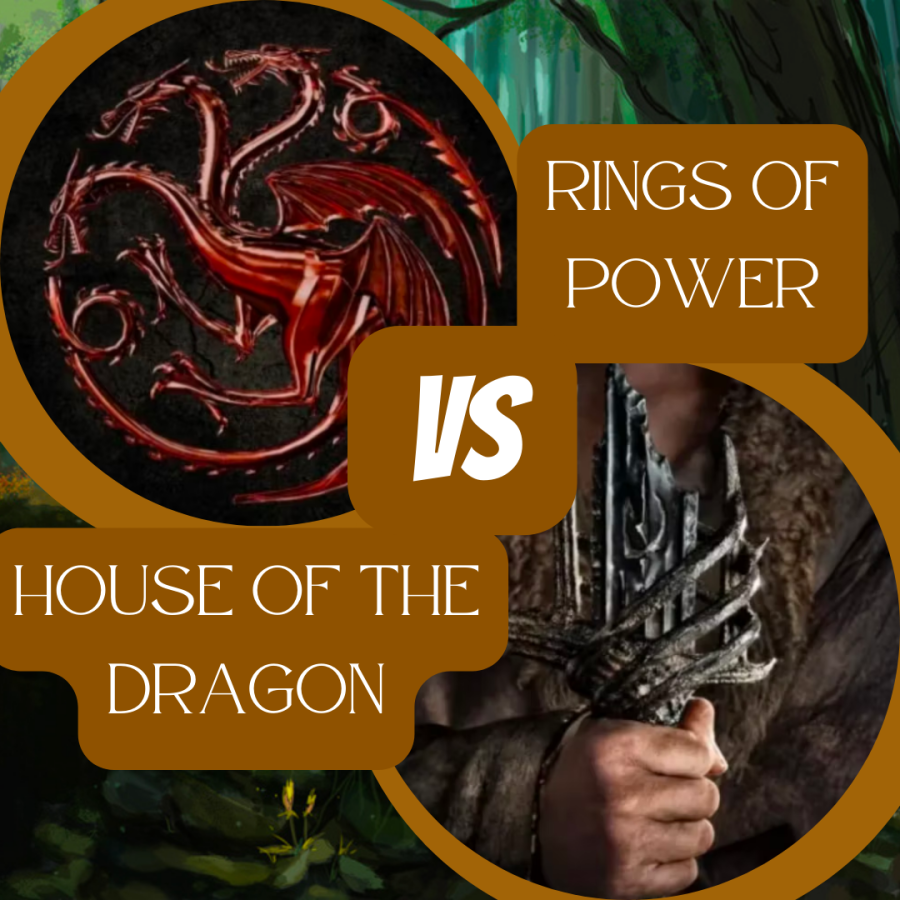A Fall full of fantasy
September 26, 2022
This fall marks the release of Amazon and HBO’s dueling spinoff series, “Lord of the Rings: The Rings of Power” and “House of the Dragon”. Chances are, if you are an avid reader, TV junkie or film buff, you are familiar with “Lord of the Rings” and “Game of Thrones”, as the franchises are two of modern entertainment’s greatest successes. Now, streaming services are interested in capitalizing on Middle-earth and Westeros’ status as household names.
Although Amazon and HBO staggered the shows’ premieres, the series’ overlapping release schedules and similarities invite comparisons from both audiences and critics. Also, it is important to note both franchises returned after less-successful installments. The final season of “Game of Thrones” has a 55% critics approval rating and a 30% audience approval rating on Rotten Tomatoes. Peter Jackson’s final film in “The Hobbit” series received a 59% critics’ approval rating. Just for reference, each film in Jackson’s original “Lord of the Rings” series received above a 90% critics’ approval rating.
Moussa Seck, a GC French professor, enjoyed the first few seasons of “Game of Thrones”, but he was not impressed with the show’s conclusion. He hopes watching “House of the Dragon” will be a better experience.
“I enjoyed ‘Game of Thrones’ in its first seasons,” Seck said. “I believe they dragged on the story unnecessarily — for financial reasons, maybe. I am currently watching ‘House of the Dragon’. My experience so far is that it is a bit slow, and the story is not clear yet. In terms of video effects, I think they can do a better job. Having the dragons fly around a couple of times is not enough to keep the audience’s attention.”
George R.R. Martin, whose books served as the foundation for “Game of Thrones”, has cited J.R.R. Tolkien’s “The Hobbit” and “Lord of the Rings” novels as major inspirations.
Dr. Brooke Conaway, an associate professor of economics, is a massive fan of both “Game of Thrones” and “Lord of the Rings”, but she prefers Westeros to Middle-earth. She has read all the books in Martin’s “A Song of Ice and Fire” series and revisited the show’s seasons multiple times. Although the series is far from over, “House of the Dragon” is living up to her expectations.
“I am watching and loving ‘House of the Dragon’,” Conaway said. “It is still too early to compare it to ‘Game of Thrones’, but so far, it has helped to scratch that ‘Game of Thrones’ itch I have had since the show ended.”
Apart from the show’s fantastical dragons and elves, the series’ record-breaking budgets are drawing attention. Amazon’s budget for the first season of “Rings of Power” is reported to be $465 million, which makes it the most expensive series of all time. On average, each episode cost $58 million. By comparison, Jackson’s original trilogy of films cost a combined $281 million. HBO’s “House of the Dragon” is not cheap either, as the series’s first season cost a reported $20 million per episode.
Grace King, a junior criminal science major, was not shocked to hear the shows’ record-breaking price tags. She thinks it is a sign of what is to come.
“It does not surprise me,” King said. “I feel like soon there will be no cable, and everything will be moved to streaming services. If HBO does not pay that, someone else will and make a huge profit.”
Conaway’s view sees the series’ massive budgets as Amazon and HBO’s investments in the future of streaming.
“Competition in streaming services has increased in recent years,” Conaway said. “Differentiation generally requires investment, so it seems Amazon is trying to one-up big-budget shows offered on other streaming services. This kind of investment is risky and does not always pay off, but a big risk can lead to a big reward.”
In the so-called “streaming wars”, content is content, and the franchises’ fans are responding. The premiere of “House of the Dragon” marked HBO Max’s most-viewed premiere to date, as the episode debuted to 10 million viewers. Amazon boasted even stronger numbers for the opening episode of “Rings of Power”, as a reported 25 million viewers checked in within the episode’s first 24 hours of release.
Lila Hacklander, a sophomore mass communication major, believes fantasy storytelling’s intrinsic, universal appeal might allow “House of the Dragon” and “Rings of Power” to attract new viewers.
“It is a way for people to escape the world they are in and experience something new,” Hacklander said. “People are so curious to get attached to a new world other than their own —especially if their world is not one they want to be in.”







